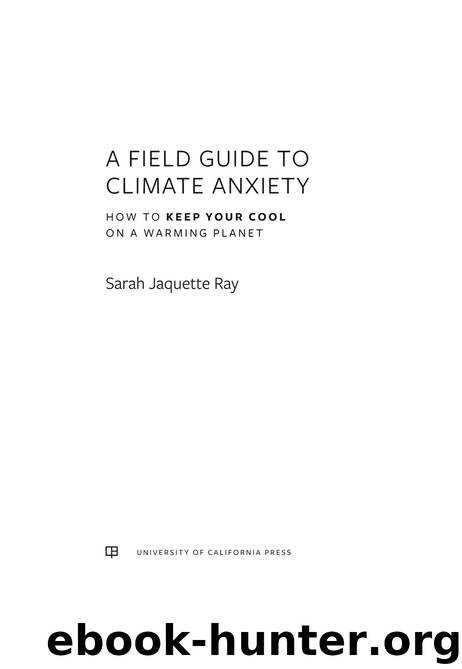A Field Guide to Climate Anxiety by Sarah Jaquette Ray

Author:Sarah Jaquette Ray
Language: eng
Format: epub
ISBN: 9780520343306
Publisher: University of California Press
Compassion—Self-Preserving and Respectful
Neuroscientists such as Tania Singer have shown that empathizing with someone in distress lights up parts of the brain associated with pain, while compassion lights up parts of the brain associated with love. Empathy involves feeling another person’s suffering, as if you are experiencing the same thing. Compassion is the ability to care about another’s suffering.
Boundaries are essential to our self-preservation. Yet whereas empathy dissolves our boundaries, compassion maintains them: it merely asks that we remain curious and understanding, and that we desire for others’ suffering to end. The term compassion fatigue, used to describe the unique exhaustion experienced by doctors, trauma workers, and emergency responders, in fact confuses compassion with empathy. Empathy fatigue is a significant cause of burnout—it can result in withdrawal, and chronic empathic distress can harm your health. Whereas empathy can be exhausted, compassion is renewable from our reserves of abundance.
The word compassion comes from the Latin root compati, meaning “to suffer with.” Mindfulness expert Judson Brewer describes suffering alongside someone as quite different than taking on suffering. But how we can stay connected without becoming exhausted by that connection? One requirement is to have compassion for oneself. Buddhists believe that compassion for the self is the solution to suffering—our own and others’. Without compassion for yourself, it is impossible to have compassion for others. And without compassion for yourself, compassion for others may overcome you. Thus compassion is a crucial tool for becoming resilient for the long haul.
Our energy to care for others comes from our attending to our own needs. The more we are able to nurture our own deepest existential desires—not just superficial wishes, but needs like feeling loved—the more energy we have for others’ needs. In order for us to continue to love the world enough to keep working to improve it, we must cultivate compassion, first of all for ourselves.
Compassionate curiosity, by helping us understand the other side’s myriad and nuanced positions, can achieve the desired end of building trust enough for cooperation, even in situations that make us angry. For example, when I first heard the chant “Drill, baby, drill,” popularized by ex–vice presidential candidate Sarah Palin in her quest to open public lands to oil drilling companies, I was horrified and angry. But I relieved my feelings by exploring the emotional motivations of this rhetoric and its impacts on me. I asked myself, What are my fears, and to what extent are they manufactured and exploited for political gain? What are the chanters afraid of? What are they attached to? What does “drilling” symbolize for Palin and her followers? I assumed the best: they were probably not trying to call forth the end of the world or the destruction of all life, which is how the chant landed on my ears. As long as I accepted that the protesters had humanity, there was a channel open for us to talk.
It doesn’t make us feel good to be angry and to imagine that others are ill intentioned and heartless.
Download
This site does not store any files on its server. We only index and link to content provided by other sites. Please contact the content providers to delete copyright contents if any and email us, we'll remove relevant links or contents immediately.
Man-made Catastrophes and Risk Information Concealment by Dmitry Chernov & Didier Sornette(6019)
The Revenge of Geography: What the Map Tells Us About Coming Conflicts and the Battle Against Fate by Kaplan Robert D(4077)
Zero Waste Home by Bea Johnson(3839)
COSMOS by Carl Sagan(3625)
Good by S. Walden(3559)
In a Sunburned Country by Bill Bryson(3542)
The Fate of Rome: Climate, Disease, and the End of an Empire (The Princeton History of the Ancient World) by Kyle Harper(3067)
A Wilder Time by William E. Glassley(2863)
Camino Island by John Grisham(2798)
Organic Mushroom Farming and Mycoremediation by Tradd Cotter(2692)
The Ogre by Doug Scott(2683)
Human Dynamics Research in Smart and Connected Communities by Shih-Lung Shaw & Daniel Sui(2501)
Energy Myths and Realities by Vaclav Smil(2493)
The Traveler's Gift by Andy Andrews(2461)
9781803241661-PYTHON FOR ARCGIS PRO by Unknown(2372)
Inside the Middle East by Avi Melamed(2357)
Birds of New Guinea by Pratt Thane K.; Beehler Bruce M.; Anderton John C(2255)
A History of Warfare by John Keegan(2244)
And the Band Played On by Randy Shilts(2210)
